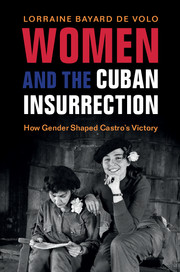Book contents
- Women and the Cuban Insurrection
- Women and the Cuban Insurrection
- Copyright page
- Dedication
- Contents
- Preface
- 1 Revolution Retold
- 2 “How Can Men Tire When Women Are Tireless?”
- 3 A Movement Is Born
- 4 Abeyance and Resurgence
- 5 Gendered Rebels
- 6 War Stories Celebrated and Silenced
- 7 “Stop the Murders of Our Children”
- 8 Masculinity and the Guerrilla War of Ideas
- 9 Women Noncombatants
- 10 Las Marianas
- 11 Past Is Prologue
- Bibliography
- Index
11 - Past Is Prologue: Victory and Consolidation
Published online by Cambridge University Press: 19 January 2018
- Women and the Cuban Insurrection
- Women and the Cuban Insurrection
- Copyright page
- Dedication
- Contents
- Preface
- 1 Revolution Retold
- 2 “How Can Men Tire When Women Are Tireless?”
- 3 A Movement Is Born
- 4 Abeyance and Resurgence
- 5 Gendered Rebels
- 6 War Stories Celebrated and Silenced
- 7 “Stop the Murders of Our Children”
- 8 Masculinity and the Guerrilla War of Ideas
- 9 Women Noncombatants
- 10 Las Marianas
- 11 Past Is Prologue
- Bibliography
- Index
Summary
THE THEATER OF WAR
Though war stories are largely written by the victors, the past remains a site of struggle. One lesson that emerges from this research is that it is not enough to have won the war, it also matters how the war was won. Writer Reinaldo Arenas, a Castro critic in exile, tells us of his time as a guerrilla, “I never even witnessed a battle; those battles were more myth than reality.” Dismissing the insurrection as “a war of words,” Arenas dismisses Castro as having “won a war that had never been fought.” Echoes of Arenas reverberate elsewhere in the anti-Castro literature: Castro is a blustering leader who gained power through an inflated war record. Meanwhile, from the pro-Castro perspective, despite the considerable rebel effort to capture the hearts and minds of domestic and international audiences, the post-1958 official story marginalizes this theater of war by its celebration of heroics on the physical battlefield. The academic literature has often followed suit, if not celebrating guerrilla war at least prioritizing it as a subject of study.
This book has not set out to determine which theater of war – the war of flesh and blood or the war for hearts and minds – is more real or worthy of victory. Rather, it is a call for balance – for greater recognition and thus analysis of the more mundane and incremental process of building legitimacy and popular support for armed conflict. The kinetic nature of the Cuban insurrection is undeniable, as bullets and bombs killed thousands. But as this book insists, militaries also fight their battles with carefully deployed language and actions aimed at gaining symbolic terrain across hearts and minds. And this battle is a gendered one. Gender both produces and is produced by war. As a central organizing principle of society, gender structures how actors understand violence, enmity, and heroism, making certain forms of violence thinkable and thus possible, and exposing certain military weaknesses while shoring up others. To the extent that scholarship on the Cuban insurrection and war more generally ignores this gendered theater of war, it fails to fully grasp how such struggles are waged and won.
- Type
- Chapter
- Information
- Women and the Cuban InsurrectionHow Gender Shaped Castro's Victory, pp. 235 - 246Publisher: Cambridge University PressPrint publication year: 2018

